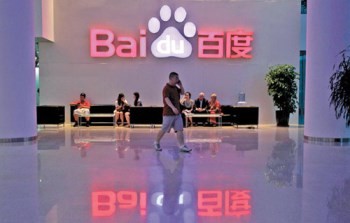Baidu Inc., China’s leading Internet search provider, announced on Thursday that it will buy back shares worth $1 billion to pacify investors, after the company’s stock price plummeted following disappointing second-quarter earnings.
The New York-listed Baidu said in a statement that its board of directors has agreed to a buyback program, under which the company may repurchase up to $1 billion of its shares over the next 12 months. The shares will be bought on and off the market and funded through Baidu's existing cash balance, the company said in a statement.
The announcement marks the Beijing-based Web search company's first buyback in nearly seven years. Baidu's share fell by 15 percent on Tuesday, with $10 billion worth of market value lost after it announced second-quarter results and guidance lower than the expectations of Wall Street investors. Its share prices were up 1.18 percent on Wednesday.
The statement also revealed plans to ramp up spending on the fast growing but costly online-to-offline (O2O) business, which connects online consumers with offline services, such as restaurants and cinemas.
"The buyback demonstrates Baidu's confidence in the O2O opportunity, and in our ability to capture it," Baidu spokesman Kaiser Kuo told FinanceAsia in an email.
Baidu generated revenue of $2.67 billion in the second quarter, a 38-percent increase from the same period in the previous year. However, net profit rose only 3.3 percent to $590.6 million, as the company began to shift from a desktop-driven business to O2O.
Tian Hou, a Beijing-based analyst with TH Capital, said that investors are worried about Baidu's future, as several O2O companies in the U.S. have recently gone bankrupt.
"More importantly, as Baidu is going mobile, its core search engine business isn't as strong as it used to be. But further developing the O2O business requires a lot of investment and time to make profits. The situation has also triggered concerns among investors," she said.
Baidu CEO Robin Lu announced earlier in June that the company would invest 20 billion yuan in O2O services over the next three years.
"There is plenty of money in the market but not many high-quality projects," said He Haiwen, a project lead at Baidu.



























